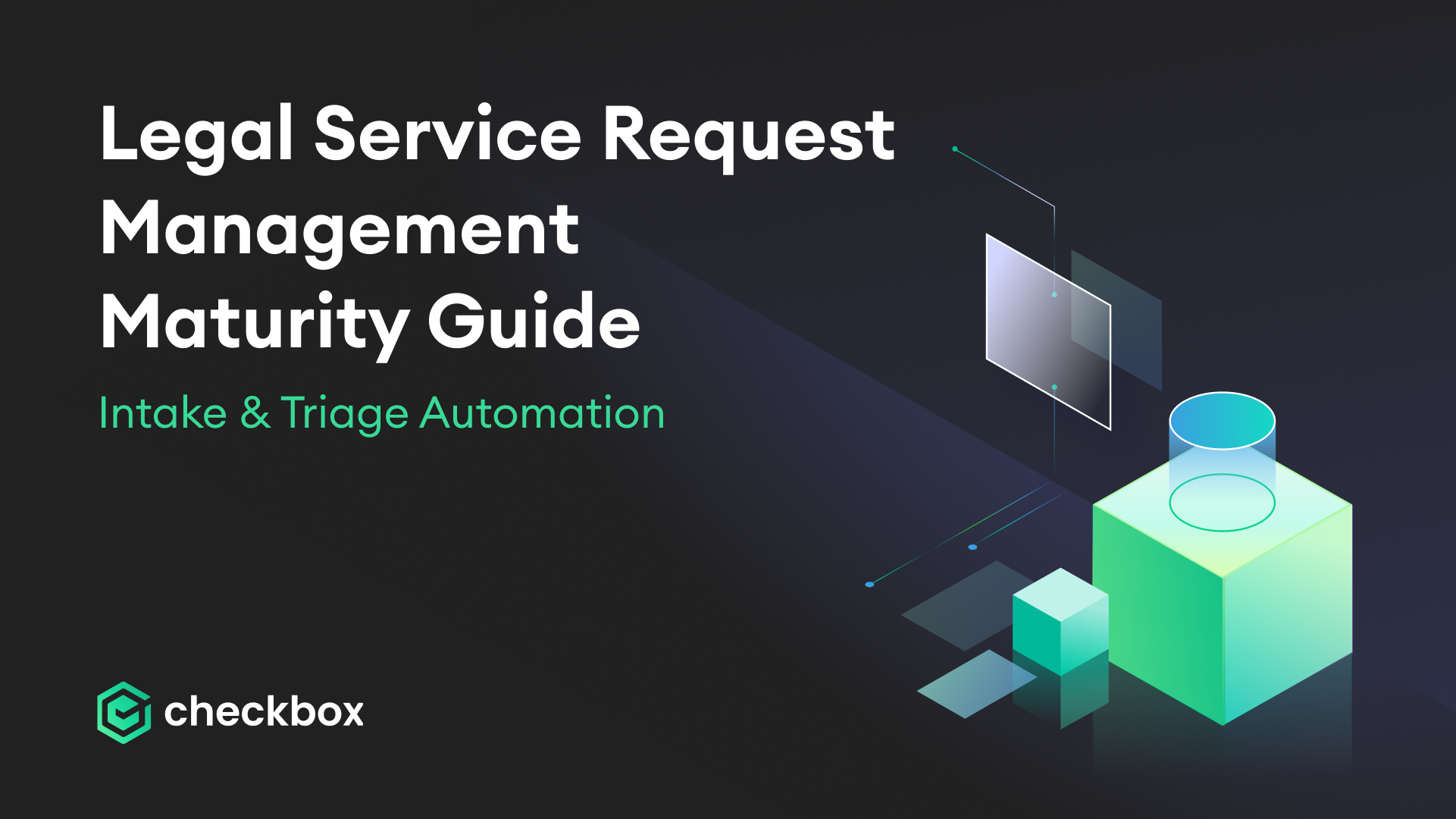
Sign up to our newsletter
Get insightful automation articles, view upcoming webinars and stay up-to-date with Checkbox
Reading time:
[reading time]

What is Forms Automation Software?
Forms automation software involves tools used to digitize the forms creation and data collection process. For in-house legal teams, this technology is critical in streamlining legal intake, triage, document automation, and other core legal workflows. Forms automation can support:
- Document automation & execution
- Legal request intake & triage
- Contract generation & approval workflows
- Compliance & risk assessments
- Service delivery & matter management

💡Pro Tip: How Do You Automate Forms?
Use a no-code platform like Checkbox to build dynamic, logic-driven workflows that capture, route, and process information automatically without relying on IT for support.
What are the Key Features to Look for in a Form Automation Software?
When selecting a forms automation platform for your legal team, consider features that support secure, accurate, and scalable legal workflows. Common features include:
| Access Controls / Permissions | Activity Dashboard | Activity Tracking |
| Alerts / Notifications | API | Approval Process Control |
| Archiving & Retention | Audit Management | Audit Trail |
| Autofill | Collaboration Tools | Conditional Logic |
| Configurable Workflow | CRM | Customizable Branding |
| Customizable Fields | Customizable Forms | Customizable Reports |
| Customizable Templates | Data Capture and Transfer | Data Import/Export |
| Digital Signature | Drag & Drop | Electronic Signature |
| Email Management | File Storage | Forms Creation & Design |
| Forms Management | Full Text Search | Offline Access |
| Process/Workflow Automation | Real Time Data | Real Time Notifications |
| Real Time Reporting | Reminders | Reporting & Statistics |
| Rules-Based Workflow | SSL Security | Surveys & Feedback |
| Task Management | Template Management | Third Party Integrations |
| Version Control | Web Forms | Workflow Management |
| Collaboration Tools | Customizable Fields | Price / Margin Management |
What are the Benefits of Using Automated Forms?
For legal teams, automated forms help to deliver faster, more consistent service to the business. They also offer a variety of other benefits that help improve day-to-day activities of every area in an organization:
⏱️ Saves Time & Money
Forms automation reduces the manual work involved with data capture and management, freeing up the time and resources for employees to perform other, highly strategic tasks that bring value to the business.
😁 Elevates the Employee Experience
Forms automation improves the user experience in digitizing and fast-tracking the submission and processing of information. For example, business users can submit legal requests or access pre-approved legal guidance without waiting on back-and-forth emails.
📊 Increases Data Quality & Reduces Errors
Forms automation guarantees a standardized way to process information. Setting up an automated system correctly ensures you can rely on consistent results every time. While form automation improves accuracy, combining it with AI-powered tools like HubSpot forms takes data quality to the next level. Hubspot's Form Shortening automatically enriches form data and optimized fields based on known visitor information, leading to higher conversion rates and more accurate data collection.
📈 Measures Metrics & KPIs Faster
Form automation software helps compile the exact information you need to measure metrics and key performance indicators you have already set. By using automated forms, you get a streamlined process that gives you access to your data to make better business decisions. For instance, legal teams can track intake volumes, turnaround times, and request types, helping them demonstrate legal’s value to leadership with data-backed insights.
✅ Improves Organization-Wide Compliance
When automating forms, information needed for compliance and auditing are already available for use. It allows you to visualize results while keeping up to date on potential problems for them to be fixed (before they turn into significant compliance issues).
🤝 Promotes Internal Collaboration
Automating forms makes it so much easier to share information across departments within an organization. For example, Checkbox’s automated intake forms enable legal teams to collaborate across departments by automatically routing requests, approvals, and documents to the right stakeholders.
How Does Form Automation Fit into Your Organization?
Legal Processes
Automated forms software help legal teams improve the access, value and speed of their services, removing any bottlenecks in the process. Below are some use-cases for forms automation and workflow automation in legal processes:
- Legal Intake & Triage – Business users and clients use form automation services with intake and triage, as automated forms provide users with intuitive, self-service tools to access services, advice and FAQs for their respective business departments.
- Automated Legal Advice – Automated forms empower business users with a digital, self-serve way to access legal advice tailored to their exact needs, and will even escalate an inquiry to the correct resource or lawyer.
- Non-Disclosure Agreements (NDAs) - Automate non-disclosure agreements from information intake using forms, to drafting, negotiation & approvals, e-signature and obligations via document automation.
- Sales Agreements - Using the power of forms intake and document automation, legal teams can significantly reduce turnaround and generate sales proposals quickly and accurately through the initial collection of agreement details.
- Other Legal Workflow Processes: Checkbox’s legal workflow automation software incorporates powerful forms that are further used to help collect insightful information to aid lawyers service their legal requests.
Related Article: Learn more about automated legal operations and the top five tasks you can automate in legal ops.
Other Departmental Use Cases
While Checkbox is purpose-built for legal, its flexible automation engine can also support adjacent teams such as risk, finance, and procurement, especially where legal intersects or governs compliance and approval workflows.
Risk & Compliance Processes
By leveraging forms automation, you can ensure that your risk and compliance teams can digitize and drive policy adoption and reduce risks by operationalizing policies and automating their workflows. Below are some examples of how for automation can be used in risk and compliance processes:
- Compliance Assessments – Forms automation allows you to assess the compliance of data risk and security on new and existing systems, processes and business activities using template-based generation and conditional content.
- Security Incident Reports – Using automation, you can provide a single digital access point for business users to report any suspected data or security breaches, minimizing the time it takes for incident reporting.
- Vendor Risk Assessment – Automating the manual interactions and security processes your compliance team deals with daily provides an intuitive, self-service tool for vendors and reduces the turnaround time for risk assessments.
Finance & Tax Processes
Forms automation can increase the clarity and accessibility of your finance department’s services, making it easier to navigate essential forms while streamlining manual work. Below are some use-cases for how your finance and tax teams can use forms automation:
- Financial Reports – Leveraging forms automation ensures quicker turnaround times for financial teams to collect data and generate reports with more accuracy, thus eliminating errors and ensuring compliance with accurate reports every time.
- Expense Approvals – Through forms, users can submit an expense approval request, and receive automated summaries and audit trails of key considerations throughout their reports.
Procurement Processes
With form automation, you can transform your current procurement processes by delivering immediate, high visibility impact to your procurement processes & service delivery to drive business-wide strategic initiatives. Below are examples of forms automation use-cases that can be used in procurement processes:
- Procure to Pay - Collect details relevant to the requested procurement and digitize procurement rules, assessments, and checklists to enable self-service and adoption through controls.
- Vendor Agreements – Forms automation allows you to automatically generate vendor agreements in just a matter of minutes through designated templates that facilitate negotiations and signing with ease.
- Modern Slavery Risk Assessment – This process is streamlined through forms automation as you can easily assess suppliers against modern slavery standards and policies to arrive at a risk rating and overall compliance score.
HR Processes (in Legal-Adjacent Scenarios)
Forms automations can help reduce administrative burden by automating the generation capability of HR services and forms. Here are some use cases for forms automation in HR processes:
- Employee Onboarding – Forms automation speeds up and improves the onboarding process for new employees by streamlining tasks for managers and HR teams. Forms automation allows managers to build tailored journeys for their new employees such as self-service tools for them to ask questions regarding their new position.
- Employee Agreements – Automating your employee agreements ensures that you generate accurate contracts every time using standardized employee agreement templates.
- Performance Reviews – Forms create a standardized performance review process that ensures accurate feedback collection for all employees and teams.
What to Consider When Choosing Form Automation Software
Do the forms offer web & responsive mobile options?
A trademark of a good form automation software is that it allows users to create forms from any device, including mobile.
How customizable are the forms?
Form automation software should allow you to fully customize and brand your forms to reflect your legal team’s workflows and requirements.
What’s the limitation of fields on the forms?
Ensure the platform supports all necessary fields to capture detailed, workflow-specific data without limitations.
What is the cost per user, forms created & responses?
Some platforms cap form volumes monthly (e.g., 100 forms for $100/month), while others offer unlimited responses at an annual rate. Compare pricing based on your usage and automation needs.
Are analytics & insights supported?
The best tools offer pre-built templates and dashboards that provide real-time visibility into form usage, legal KPIs, and workflow effectiveness.
What’s the level of workflow automation the form provides?
Look for automation that goes beyond data collection, such as routing, triage, and conditional logic, to streamline full legal workflows from intake to resolution.
How safe is your data?
Your form platform should support secure data storage, transmission, and access control, aligned with enterprise-grade compliance standards.
What are the integration/API capabilities of the form?
Ensure the tool integrates with your existing systems like Google Drive, Outlook, and CRMs to automate downstream actions and reduce manual effort.
How Can Checkbox Help?
At Checkbox, we don’t just do form processing automation. We offer a purpose-built platform for in-house legal teams.
Checkbox combines legal intake, matter management, and workflow automation into a single platform to provide one source of truth for legal teams. With Checkbox, legal teams can:
- Automate legal intake, triage, and self-service
- Track matters and legal team workload in real-time
- Generate documents and contracts with smart templates
- Configure and automate workflows (i.e. approvals, reminders, and escalations)
- Decision and calculation automation
- Report on legal KPIs and demonstrate impact to leadership
As a leading legal workflow automation platform, Checkbox empowers business functions to automate their tedious, manual processes and streamline their service delivery. Because Checkbox requires no technical knowledge and is truly no-code, legal teams can enable digital transformation in a matter of days, not months.
To get started, book a call with one of our technology consultants and figure out where you can get started on your no-code legal automation journey.
Frequently Asked Questions
What is forms automation software?
Forms automation software digitizes form creation, submission, and processing to streamline data collection and trigger workflows automatically. It helps reduce manual tasks, improve accuracy, and accelerate business processes.
What are the benefits of a digital form?
Digital forms save time, eliminate data entry errors, and standardize how information is collected and processed. They also improve user experience with self-service access and real-time tracking.
What makes Checkbox different?
Checkbox is purpose-built for in-house legal teams, combining smart intake, matter management, and workflow automation in one no-code platform. It empowers legal to deliver faster service, track performance, and scale operations without IT support.
How can I choose the best form automation tool for my needs?
Look for a tool that aligns with your specific workflows, offers no-code customization, and integrates with your existing systems. Prioritize features like conditional logic, reporting, and security to support scalable, compliant automation.

Checkbox's team comprises of passionate and creative individuals who prioritize quality work. With a strong focus on learning, we drive impactful innovations in the field of no-code.
Book a Demo
See the New Era of Intake, Ticketing and Reporting in Action.

.svg)


